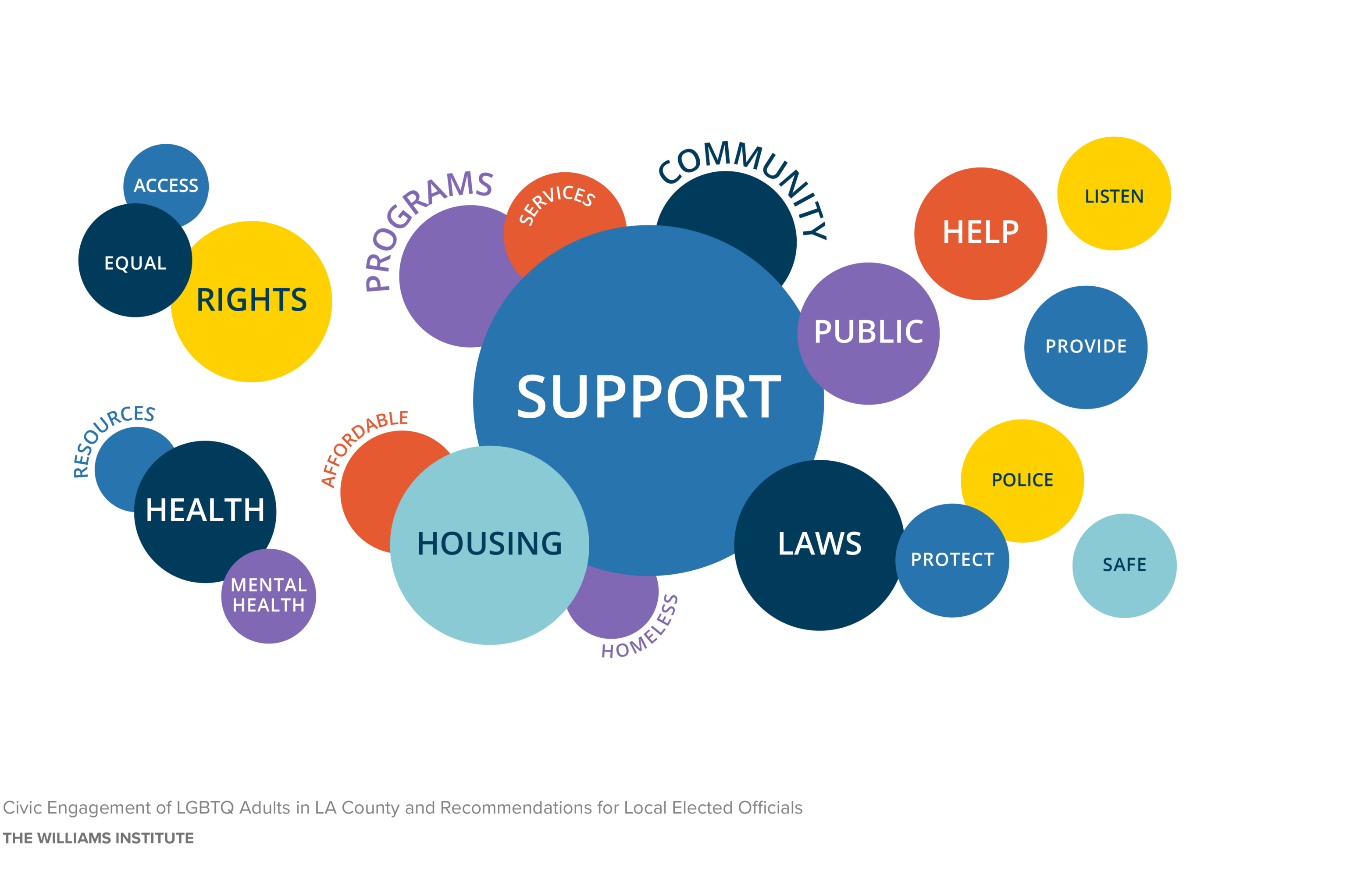Executive Summary
Approximately 665,000 LGBTQ adults live in Los Angeles County. Using data collected from a representative sample of over 500 LGBTQ adults surveyed in 2023 and 2024, this report focuses on LGBTQ Angelenos’ assessment of local elected officials and services and, in their own words, their recommendations for local elected officials. It also discusses how LGBTQ people are not only actively engaged in LGBTQ issues in Los Angeles County but across a broad range of causes and issues.
Based on 368 specific recommendations from a diverse sample, LGBTQ Angelenos would like the following from local elected officials:
- Visible allyship. LGBTQ Angelenos would like elected officials to listen to their input, support them, and join them in better educating the public about LGBTQ communities and advocating for their needs.
- Representation in government. LGBTQ Angelenos want visible allyship and to be part of government at all levels, from government employment to serving on advisory boards and committees to being elected officials themselves.
- Economic assistance. LGBTQ Angelenos share broader concerns about the high cost of living in Los Angeles. They want support for programs to help people who are unhoused and have low incomes, as well as initiatives to make housing, health care, education, and transportation affordable in Los Angeles for everyone.
- Community safety. LGBTQ Angelenos would like more protection for their communities, greater enforcement of hate crime laws, and for law enforcement to be better trained to meet their needs.
- Equal rights. LGBTQ Angelenos not only want strong local LGBTQ legal protections in place but to see those protections consistently enforced, including protections from discrimination and harassment.
- Support for vulnerable subpopulations. Many LGBTQ Angelenos pointed out the need for elected officials to pay particular attention to the needs of transgender people and LGBTQ people of color, youth, and older people.
Key Findings
Responsiveness of Los Angeles County Elected Officials
- Just under half of LGBTQ people (46%) agreed with the statement that elected officials in Los Angeles County are responsive to the needs of the LGBTQ community, and 21% disagreed with this statement (the rest were neutral).
- Fewer LGBTQ people of color (40%) agreed with the statement that elected officials are responsive to the concerns of LGBTQ people than white LGBTQ people (59%). One in four (25%) LGBTQ people of color disagreed with the statement compared with 12% of white LGBTQ people.
Assessment of Los Angeles County Programs and Services
- Three-fourths (75%) of LGBTQ people agreed with the statement that Los Angeles County programs and services are welcoming to LGBTQ people, while 10% disagreed with this statement. The rest were neutral.
- Only one service area was rated as very welcoming by over half (56%) of LGBTQ people— the library system.
- Five other service areas were viewed by over half of LGBTQ people as either somewhat or very welcoming: parks and recreation, voting and elections, health services, mental health services & support programs such as CalFresh and CalWORKs.
- The service areas rated as the least welcoming were all part of the criminal legal system, including the Los Angeles County jails, the Probation Department, the District Attorney’s Office, the Public Defender’s Office, the Alternate Public Defender’s Office, and the Los Angeles County Sheriff’s Department.
- LGBTQ people of color are more likely to use and rely upon County programs and services, but overall, did not rate them to be as welcoming as white LGBTQ people.
Civic Engagement of LGBTQ Community Members
- The majority of LGBTQ people (83%) actively engage with non-profits and government by volunteering, donating money, and expressing their views through petitions and protests to elected officials directly or online.
- LGBTQ people engage in a wide range of social and political issues, including women’s issues, racial justice, immigration, environmental issues, disaster relief, hunger, homelessness, and others. In the past year, over half (54%) reported engaging on both LGBTQ issues and other issues, 27% reported engaging on just non-LGBTQ issues, and only 1% reported engaging on just LGBTQ issues.
- In the past year, approximately half of LGBTQ people have donated to a charitable cause or community organization (55%), signed a petition (48%), or posted online about social issues (47%). Over one in four reported volunteering with a community group (27%) or contacting a public official to express their feelings about a particular issue (24%).
LGBTQ people are already engaged as volunteers, donors, and constituents, with most actively supporting both LGBTQ and non-LGBTQ issues. They seek to work together in partnership with elected officials as constituents, government employees, and increasingly as elected officials to improve Los Angeles County not only for LGBTQ communities but for everyone.
